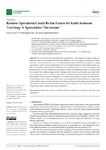| dc.contributor.author | Alves, Carlos | |
| dc.contributor.author | Figueiredo, Carlos Alberto Machado | |
| dc.contributor.author | Sanjurjo-Sánchez, Jorge | |
| dc.date.accessioned | 2021-05-24T15:28:57Z | |
| dc.date.available | 2021-05-24T15:28:57Z | |
| dc.date.issued | 2020-12-01 | |
| dc.identifier.citation | Alves, C.; Figueiredo, C.; Sanjurjo-Sánchez, J. Remote Operations Could Be the Future for Earth Sciences Teaching: A Speculative Discussion. Environ. Sci. Proc. 2021, 5, 9. https://doi.org/10.3390/IECG2020-08736 | es_ES |
| dc.identifier.issn | 2673-4931 | |
| dc.identifier.uri | http://hdl.handle.net/2183/27993 | |
| dc.description.abstract | [Abstract] The current COVID-19 pandemic has created havoc in the regular workings of many institutions, such as those dedicated to teaching; therefore, there is an urge for alternatives to traditional face-to-face teaching. However, for certain subjects, such as Earth Sciences, distance-teaching approaches could be seen as counterintuitive to the essential foundations of the subject (where empirical information, especially from fieldwork, is considered paramount for its foundation and growth). In this work, we consider remote operations that could complement, improve, and perhaps even replace the traditional approach for teaching Earth Sciences, potentially producing better learning outcomes, even in relation to laboratory and fieldwork, including studies involving locations outside of planet Earth. Additionally, we consider the possible advantages for other professional settings related to this area, such as those concerning terrain characterization for engineering works, mineral resources, and environmental studies, as well as possible support for space missions and stations in other astronomical bodies (where mineral exploration and extraction could be developed and, hence, benefit from remote operations). | es_ES |
| dc.description.sponsorship | Portugal. Fundação para a Ciência e a Tecnologia; FCT-UIDB/04509/2020 | es_ES |
| dc.description.sponsorship | Portugal. Fundação para a Ciência e a Tecnologia; FCT-UIDB/04028/2020 | es_ES |
| dc.description.sponsorship | Xunta de Galicia; ED431B 2018/47 | es_ES |
| dc.description.sponsorship | Xunta de Galicia; R2017/008 | es_ES |
| dc.language.iso | eng | es_ES |
| dc.publisher | MDPI | es_ES |
| dc.relation.uri | https://doi.org/10.3390/IECG2020-08736 | es_ES |
| dc.rights | Atribución 3.0 España | es_ES |
| dc.rights.uri | http://creativecommons.org/licenses/by/3.0/es/ | * |
| dc.subject | Teaching under isolation conditions | es_ES |
| dc.subject | Fieldwork | es_ES |
| dc.subject | Laboratory work | es_ES |
| dc.subject | Space exploration and exploitation | es_ES |
| dc.title | Remote operations could be the future for Earth Sciences teaching: a speculative discussion | es_ES |
| dc.type | info:eu-repo/semantics/article | es_ES |
| dc.rights.access | info:eu-repo/semantics/openAccess | es_ES |
| UDC.journalTitle | Environmental Sciences Proceedings | es_ES |
| UDC.volume | 5 | es_ES |
| UDC.issue | 1 | es_ES |
| UDC.startPage | 9 | es_ES |






